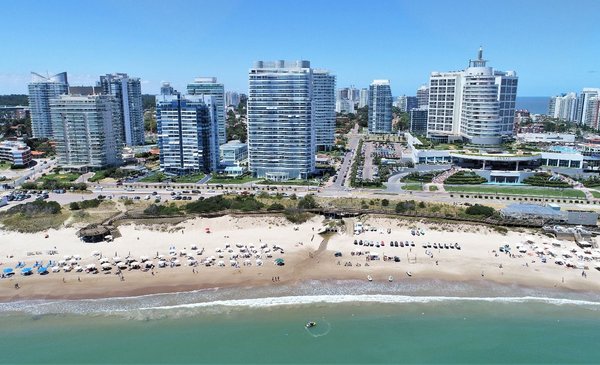“Tourists who entered in January 2023 are 10% more than those who entered in January 2019,” announced the President of the Republic, Luis Lacalle Pou, in his accountability speech before the General Assembly on March 2. .
This overcoming of the pre-pandemic is an indication that is reflected in the operators of the tourism sector that began to see a light this season after the dark tunnel that the covid-19 pandemic was for the sector.
The outlook for January and February—the strongest months of the season—according to the president of the Uruguayan Chamber of Tourism, Marina Cantera, told El Observador “is very positive from every point of view.”
“The tourism sector has returned,” Cantera remarks, highlighting the record occupation of the first days of January and also of Carnival, which, in addition to being immediate good news, represent signs of the recovery of a sector that was in trouble.
There are nuances, some destinations that were better than others and certain sectors worked more than others, but that fine thread will be seen once the Chamber of Tourism concludes a study of the season that it is currently carrying out together with Ceres. In any case, it can be affirmed that the vedettes of the season continue to be the destinations on the coast, from Canelones to Rocha; although others have been able to position themselves, as is the case of Cologne.
This optimism is also reflected in the outlook for Easter. “This week there is a lot of work on internal tourism; there is not so much expectation for the entry of tourists from abroad and so far the reservations have been very good,” Cantera points out.
For this week, the president of the Chamber of Tourism points out that the star within the local offer is in rural tourism.
At the same time, there are also many reservations to leave the country. “There is a lot of dynamics in the travel agencies,” Cantera points out, noting that there will be a “very important” movement of Uruguayans traveling to Argentina this week. “Obviously this affects the national tourism sector,” she says.
In the same vein, the interim Minister of Tourism, Remo Monzeglio, who also highlights the good performance of the season and the joint work with the operators, predicts good prospects for the Tourism Week. “Generally it is a carbon copy of Carnival,” recalls Monzeglio and agrees that there will be many Uruguayans who choose Argentina as their destination. In his view, this is not worrisome for the tourism industry since it is a “roundtrip” activity. “It is a right and Uruguayans who work so hard have the right to travel wherever they prefer,” he says.
Travel agencies confirm that Argentina is one of the most chosen destinations. For example, in the case of Hiperviajes, the offer to this country is already exhausted and there are a few places left for Brazil, another one preferred by Uruguayans, along with the Caribbean, where everything is already sold.
The challenges of the sector
Getting off the roller coaster that the sector has been on in recent years is the main challenge for the business union. “Stability”, repeats Cantera and emphasizes the need to be able to work continuously; something that, in recent months, has been fulfilled.
However, Tourism still has pitfalls to overcome, such as the high costs that fully affect the profitability of the sector. “Prices have been maintained and although world prices have risen a lot after the pandemic, Uruguay has had very strong downward pressure on market prices and that has meant that prices have not been able to rise as they should to be for the costs that we have today and for how the market is at an international level”, explains Cantera.
The Camtur president still cannot define how much higher the rates should be for the business to return to the profits of yesteryear, but they do need to go up. “Costs are putting a lot of pressure on companies,” she acknowledges, and this ends up having an impact on their profitability.
“Uruguayan prices have to continue their recovery, they were seen to be very low during the pandemic,” Cantera emphasizes when asked about what she expects in terms of rates for the future and points out that prices will be regulated by supply and demand and also depending on the neighboring countries.
At the same time, for “sun and beach” destinations, it is essential to seasonally adjust the business. “There are two months that exceed the break-even point and 10 or 9 months that in general can be the same as the break-even point or well below it, being able to manage prices in this dynamic is very complex,” Cantera points out. Within this framework, some companies —as is the case of Enjoy Punta del Este— organize events to encourage the arrival of the public outside of summer.
The recovery numbers
During the strategic conference that the Uruguayan Chamber of Tourism carried out in the last days of February, an assessment of the first two months of the year was carried out and initiatives and objectives were established for 2023 such as tourism promotion, the tourist observatory, training , the strengthening of the destinations and the organization.
According to the most recent monitor published by Camtur in this context, the Carrasco airport as of February 22 is at 80% recovery in terms of passengers, compared to the pre-pandemic era and with a record number of destinations compared to the last years. Uruguay is currently directly connected to 14 cities.
Meanwhile, the data obtained from the Tres Cruces Control Tower and disseminated in the report indicate that from December 15 to February 22, 2023, 68,085 trips were made with 1,906,380 passengers on short, medium, and long-distance trips. and international while from December 15, 2021 to February 22, 2022, 65,262 short, medium, and long-distance and international trips were made that transported approximately 1,827,336 passengers, which shows an increase of 0.4%.
The growth becomes more evident when it comes to medium distance and especially international trips in which the increase was 386% in 2023 compared to 2022. However, it is 22% less than in the pre-pandemic.
Regarding occupancy in the most emblematic destinations, in Montevideo hotel rooms were between 70% and 75% of their capacity in January and between 65% and 70% in February.
In Piriápolis there was a large influx of public during the first fortnight and an average occupancy of between 80% and 85%. In the second fortnight there was a drop and the average occupancy remained between 70% and 75%.
Another story was seen in February. The occupancy average stagnated between 40% and 50%, except for a maximum of four days during Carnival.
As for the stays, they were in fortnights, 10 nights and 7 nights per week. Regarding the real estate sector, the requests were shorter, for three nights or weekends.
In Rocha, out of a universe of 64 hotels and a sample of 19 hotels in the department, the average occupancy in the month of January was 82.51%.
Meanwhile, Colonia has the highest occupancy rates in the last four years. In this case, according to the monitor, there is growth in occupancy in all hotel categories for this season compared to 2022, 2021, 2020 and 2019. The 2023 Carnival holiday far exceeded the expectations of the sector, reconfirming that It is historically one of the periods of the year with the highest occupancy, reaching an average occupancy of 90% in the department. In this particular period, in Colonia del Sacramento Argentines represent 45% of the tourists staying, then Uruguayans 36% and Brazilians 13%.
Finally, in Canelones the general occupancy average from January 1 to the carnival holiday in February was 86%. The general opinion is that it worked better than the previous season, but it did not reach the pre-pandemic numbers.


















